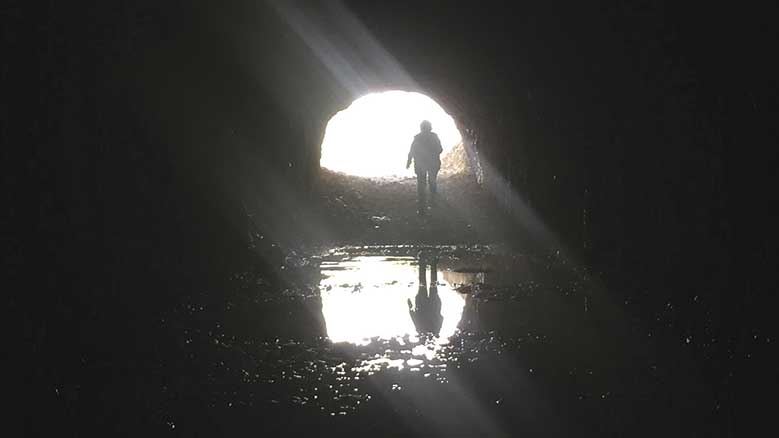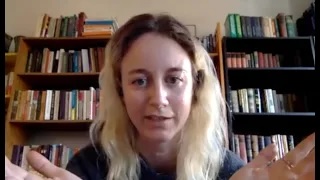
I sat in the center of the bustling student union of my alma mater with a table full of Quaker Voluntary Service materials and a bowl full of chocolate. As I encouraged passing students passionate about social justice to apply for the program, I found myself minimizing the spiritual part. On a campus where “religious life” means going to an a cappella concert in the chapel or maybe having matzoh in the dining hall for a few weeks each year, religion just isn’t a language that’s commonly or fluently spoken there. I didn’t know how to share the things I love about the program in a genuine way without feeling like I was selling its spirituality. And I didn’t know how to sell spirituality without sounding like a missionary. So I stuck to the SPICES: simplicity, peace, integrity, community, equality, social justice—aren’t these values that we’d all like to live into more? Heads nodded, and hands picked up pamphlets.
There is a tension between the mass appeal of Quaker values and the fact that being spiritual or religious is hard, and I think it’s supposed to be hard. The most surprising thing I’ve learned from my year with Quaker Voluntary Service is how much effort and intentionality is required to live into these values—something wholly different from simply adopting them as your personal brand. It’s not as easy as saying “of course integrity is important to me” or “yeah, I’m pretty into community nowadays.” To truly embody these values in your actions is increasingly complicated in a culture that prioritizes profits over human life, dehumanizing people and humanizing corporations. To truly live into these values means making yourself uncomfortable and confronting the habits that white supremacist culture has instilled in you: what have you become from existing in a culture that favors efficiency over process, perfectionism over learning, and individualism over teamwork? I explore these questions over and over in the microcosm that is my intentional community.
Community is messy, fun, and scary; sometimes I don’t even know what it means. How do we consider ourselves an intentional community if the eight of us barely have time between all of our work and activist causes to find a time to sit down together for a meal? How does fear show up in the way we approach conflict? What are the parts of ourselves that come out when we share space and resources?
I’ve been sitting with such queries in and out of the meetinghouse. I haven’t been able to stop asking myself questions that make me consider how I relate to my community and how I relate to the world. The tone is somewhere between curiosity and prodding interrogation.
In our house, we use the Enneagram personality system in order to learn more about ourselves, how to interact with each other, and how to become more whole and closer to Spirit or God. What are the patterns of behavior that define us? What ways of behaving have our bodies memorized in order to protect us from the harshness of the world? What do we have to become awakened to in order to live fully in the world? What must we reckon with in order to become more whole, more at peace? What do we need to let go of? In this way, I know that loss is necessary for community to grow, for individuals to become the most honest versions of themselves. “What do I need to give up?” is a question that showed itself in my head first in September, and then with increasing frequency as the fall deepened into winter.
The time the question first popped into my head, I was having a conversation with my friend Hayley (who is more Jewish than I am) about Yom Kippur. She said that she never really connected with the holiday, since it’s all about repenting for your sins of the past year. Like other fasting holidays, it’s pretty solemn. Hayley said she didn’t connect with that until she heard a podcast that explained it in a different way. The episode of Stuff Jews Should Know talked about how Yom Kippur is all about radical self-growth and becoming closer to God. Instead of asking the question “What sins have I committed in the past year?,” perhaps the better and more productive approach is to ask “What do I have to give up in order to be more whole in the new year?” Or you can phrase it in other ways: What parts of me are holding me back from the person that I can be, that I know I am? What do I need to give up to live in the world more fully and with integrity?
These questions hit me strong and hard. I could see what I needed to give up, clearly, through living in community.
Here in community, I can see how selfishness and an attachment to an absurd idea of private property lead me to feeling weirdly possessive of the yoga mat that I brought from home in August. I can see how a fear of open conflict forces me to dwell in my negativity, taking on a burden that no one else can see. I can see how the economy of the outside world permeates our relationships, and I tend to see my worth only in terms of whether I’ve had time to make the granola or clean the bathroom yet this week. I can see how a scarcity mindset can quickly develop, even though we have more than enough food for everyone.
I see how the uglier parts of me are incompatible with the value of community, and I tell myself that it is okay to let these things go, even though they have been a part of who I am for a very long time. This involves loss so I allow myself to grieve.
This is painful. This is mundane. I think this is also sacred.
Olive, one of my housemates who identifies as Quaker, said that the “light” that modern-day Quakers talk about—that of Spirit within us, which we invoke regularly in worship in order to ask for prayer for someone—is actually derived from something harsher than the concept many Quakers nowadays imagine. Early Quaker scholar Rosemary Moore wrote that “‘the light’ was an overwhelming invasive force, not a vague mental illumination.” The light was the direct experience of God, and it was painful.
There is a pain that comes from directly confronting those parts of you that are holding you back. There is, in particular, a blinding pain that can come from acknowledging privilege you were given by society—privilege that not only has an opposite effect on those who are marginalized but that also harms you, too. Privilege makes you believe that you are more worthy of certain treatment or behavior just because of who you are and where you come from. Whiteness comes in and creates power-hungry individuals where there were once the seeds of loving members of community.
I’m still not a Quaker. I don’t know if I ever will be. For now, I’m the Unitarian daughter of a Jewish mother and a father who comes from a family of Lutheran ministers. For now, I’m trying on Quakerism and seeing how it feels to allow myself to embody it fully.
Living into Quaker values for me isn’t just donning a cloak of wholesome ideals. It is also a stripping down: an examining, questioning, and acceptance that I will have to leave some things behind in order to continue on the long journey. I say goodbye to them, these uglier but still somehow dear parts of myself, and I walk onward.




Thank you for this inward light. It sparked thoughts for me to interact with.